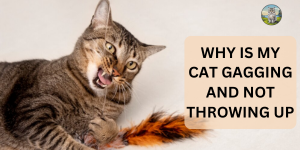If you’ve ever seen your cat gagging but not actually throwing up, you’re probably concerned. Cats are known to vomit occasionally, but when they gag without anything coming out, it can be confusing and worrying. While gagging is sometimes harmless, it’s important to understand what’s going on and when you should take action.
In this article, we’ll look at the reasons why cats might gag but not throw up, what causes it, and what you can do to help your cat feel better.

What Does Gagging Look Like in Cats?
Before we dive into the causes, let’s explain what gagging actually looks like. Gagging in cats usually involves their head and neck extending forward, a repeated “heaving” motion, and often some coughing or choking sounds. It can seem like they’re about to vomit, but nothing comes out.
Now that we understand the behavior, let’s explore some of the reasons your cat might be gagging but not vomiting.
Common Reasons for Gagging Without Vomiting
Hairballs
One of the most frequent reasons your cat might gag without vomiting is due to hairballs. Cats groom themselves often, and during this process, they swallow a lot of loose fur. Most of the time, this fur passes through their digestive system. However, some fur can clump together in the stomach, forming what’s known as a hairball.
When the hairball becomes large, your cat may try to cough it up. This leads to gagging. If the hairball doesn’t come out, your cat will continue gagging without actually throwing up. Hairballs are more common in long-haired cats, but even short-haired cats can get them.
Something Stuck in the Throat
Cats are curious animals, and sometimes they can swallow things they shouldn’t. If your cat has something small stuck in their throat, like a piece of string or plant, they might gag repeatedly but not be able to vomit.
If you notice your cat pawing at their mouth, drooling, or refusing to eat, they could have something lodged in their throat. This requires quick action, and it’s important to consult a vet if the object doesn’t pass naturally.
Respiratory Issues
Cats can also gag if they have respiratory problems. Just like humans, they can catch colds, suffer from asthma, or develop other breathing issues. Respiratory infections can irritate the throat, leading to gagging or coughing.
If your cat is gagging and you notice other symptoms like sneezing, coughing, or runny eyes and nose, it could be a sign of an upper respiratory infection (URI). Asthma can also cause gagging, especially if the airways are constricted. If you think your cat might have a respiratory issue, a vet can help diagnose and treat the problem.
Allergies
Cats can suffer from allergies, which might cause them to gag without vomiting. Allergies to things like pollen, dust, or even certain foods can irritate a cat’s throat and lead to gagging.
If your cat suddenly starts gagging and you’ve recently changed their food or used new cleaning products, it might be an allergic reaction. Watch for other signs of allergies like itching, sneezing, or watery eyes, and try to remove any potential allergens from their environment.
Nausea Without Vomiting
Your cat may also feel nauseous without vomiting. Just like us, cats can experience nausea due to several factors, like eating something that doesn’t agree with them or even motion sickness during travel. When cats feel nauseous, they may gag as their body tries to vomit, but if there’s nothing in their stomach to expel, the gagging won’t lead to actual vomiting.
In these cases, the gagging might pass once your cat’s stomach settles down. However, if the nausea is frequent or severe, it’s a good idea to talk to your vet.
Inflammation or Irritation in the Throat
Sometimes, your cat’s gagging could be caused by inflammation or irritation in the throat. This could happen after your cat has been exposed to something irritating, such as smoke or dust, or if they have a mild infection. If their throat is irritated, they may gag in an attempt to clear the irritation, even if they aren’t trying to vomit.
Dental Issues
Believe it or not, dental problems can also lead to gagging. If your cat has a bad tooth, gum disease, or an infection in the mouth, it can cause discomfort that leads to gagging. Check your cat’s mouth for any signs of redness, swelling, or a bad smell, and consult your vet for a dental checkup if needed.
When Should You Worry?
While occasional gagging is often not a cause for concern, there are situations where you should seek help for your cat. Here’s when it’s time to worry:
Frequent Gagging: If your cat is gagging several times a day or if the episodes last for more than a day, it’s a good idea to consult your vet. Persistent gagging could be a sign of a more serious problem.
Difficulty Breathing: If your cat is having trouble breathing or seems to be gasping for air along with gagging, this could be an emergency. Labored breathing can be a sign of an obstruction or a respiratory problem that requires immediate attention.
Excessive Drooling or Pawing at the Mouth: If your cat is drooling a lot or keeps pawing at their mouth, they may have something stuck in their throat or be dealing with dental pain.
Loss of Appetite or Weight: If gagging is accompanied by a refusal to eat, weight loss, or general lethargy, these could be signs of a more serious illness that needs medical attention.
How to Help Your Cat
Here are a few things you can do to help your cat if they’re gagging but not vomiting:
Hairball Remedies: If your cat’s gagging is caused by hairballs, there are several things you can try. Brushing your cat regularly can help reduce the amount of fur they ingest. You can also offer hairball control treats or talk to your vet about special diets designed to reduce hairballs.
Remove Foreign Objects: If you think your cat might have something stuck in their throat, check their mouth carefully. However, if you can’t see or remove the object easily, don’t try to force it. Take your cat to the vet as soon as possible.
Allergy Management: If allergies seem to be the cause of the gagging, identify and remove potential allergens from your home. This might include switching to hypoallergenic cleaning products or changing your cat’s food.
Visit the Vet: If the gagging persists or if you notice other concerning symptoms like difficulty breathing, loss of appetite, or lethargy, it’s time to consult a vet. Your vet can perform tests to find the underlying cause and recommend the appropriate treatment.
Conclusion
While seeing your cat gagging but not throwing up can be concerning, it’s important to understand the potential causes and know when to seek help. From hairballs to respiratory issues, there are many reasons your cat might be gagging without vomiting. By keeping an eye on your cat’s behavior and knowing the warning signs, you can ensure they stay healthy and comfortable.
For more advice on caring for your feline friends, check out cattoptips for expert tips on keeping your cat happy and healthy.


